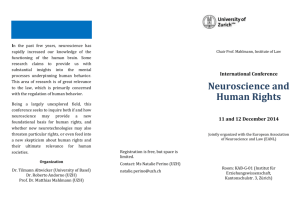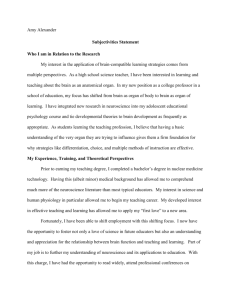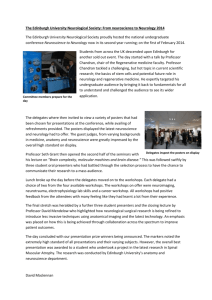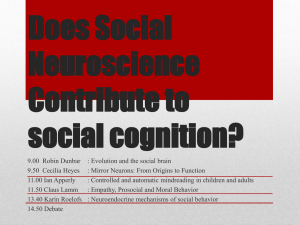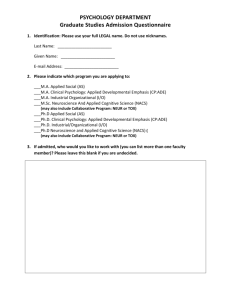15-16 Handbook - Neuroscience
advertisement
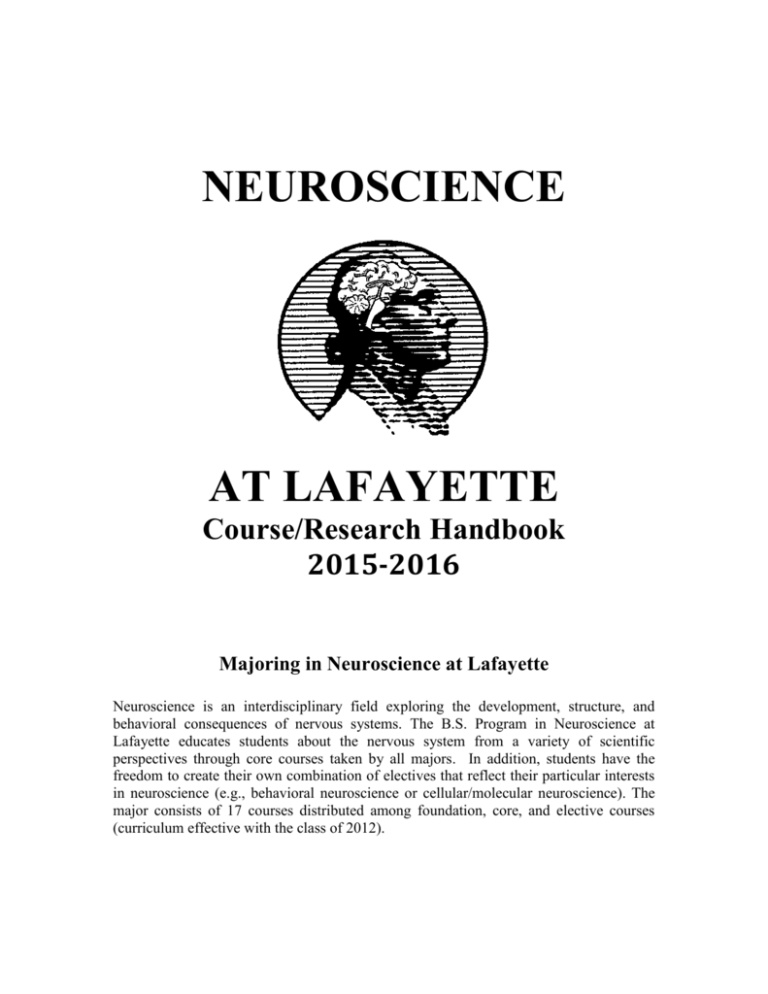
NEUROSCIENCE AT LAFAYETTE Course/Research Handbook 2015-2016 Majoring in Neuroscience at Lafayette Neuroscience is an interdisciplinary field exploring the development, structure, and behavioral consequences of nervous systems. The B.S. Program in Neuroscience at Lafayette educates students about the nervous system from a variety of scientific perspectives through core courses taken by all majors. In addition, students have the freedom to create their own combination of electives that reflect their particular interests in neuroscience (e.g., behavioral neuroscience or cellular/molecular neuroscience). The major consists of 17 courses distributed among foundation, core, and elective courses (curriculum effective with the class of 2012). The Neuroscience Curriculum FOUNDATION COURSES BIOL 101 General Biology I w/ lab PSYC 110 Introduction to Psychological Science w/ lab PSYC 120 Quantitative Methods in Psychology CHEM 121 Introductory Chemistry I w/ lab CHEM 122 Introductory Chemistry w/ lab CHEM 221 Organic Chemistry I w/ lab PHYS 111 or 131 Mechanics & Thermodynamics, w/ lab PHYS 112 or 133 Electricity, Magnetism, & Optics, w/ lab (Note: As part of the Common Course of Study, Neuroscience Majors must take a quantitative course. We recommend a calculus-based math course. Students considering medical school should take Chem 222 in addition to Chem 221) CORE COURSES NEUR 201 Intro to Neuroscience PSYC 323 Physiological Psychology w/ lab BIOL 256 Neurobiology w/ lab) NEUR 401 Advanced Neuroscience MAJOR ELECTIVES 5 total courses, at least 2 from each category below Category A Category B PSYC 203 Design & Analysis PSYC 225 Psychopharmacology BIOL 212 Developmental Biology w/ lab BIOL 213 Comparative Vertebrate Anatomy w/ lab* BIOL 214 Neuroanatomy w/ lab BIOL 245 Immunology w/lab* BIOL 251 Human Physiology w/ lab* BIOL 255 Molecular Genetics w/lab) BIOL 310 Aging and Age-Related Diseases BIOL 312 Cell Biology PSYC 232 Abnormal Psychology PSYC 236 Applied Behavior Analysis PSYC 256 Cognitive Psychology PSYC 321 Learning PSYC 322 Perception w/ lab PSYC 324 Comparative Psychology: Animal Behavior w/ lab AGS 201 Introduction to Aging Studies PHIL 225 Philosophy of Mind PHIL 230 Theories of Knowledge NEUR 255 Music & the Brain NEUR 275 Art, Neuroscience and Consciousness NEUR 351 (Neurophysiology) BIOL 314 Anatomy of Vision BIOL 336 Evolutionary Genetics BIOL 274 Bioinformatics CM 151 Computational Methods w/lab NEUR 351 (Neurophysiology) CHEM 351 Biochemistry Survey *requires Biol 102 or equivalent AP credit One Independent Study (NEUR 391/392), Advanced Research (491/492), or Honors (NEUR 495/496) course may also be used as an elective course. Research Opportunities in Neuroscience Hands-on involvement in research is considered a central component of the Neuroscience Program at Lafayette College. This research serves many purposes: it offers you unparalleled opportunities to understand an aspect of neuroscience; you will experience what neuroscience research actually entails; and you may even get to present your work at local or national meetings, or possibly publish your work in a refereed scientific journal. It is never too early for you to begin to garner the benefits of direct involvement in neuroscience research. Neuroscience majors interested in gaining a research experience may enroll in either Independent Study (Neur 391, 392), Advanced Research (Neur 491,492), or Thesis (Neur 495-496). In any case, the student works individually with a faculty mentor on a specific research project. Independent Study (Neur 391,392) is normally taken by students interested in exploring a topic not available through regularly offered courses. Independent Study may include library or laboratory research; the nature of the course is decided through discussions between the interested student and the faculty member. Advanced Research and Thesis are reserved for projects that emphasize original research. Depending on the scope of the research project, students will enroll in Advanced Research for either one or two semesters. No more than four credits of Advanced Research may be applied toward graduation or fulfillment of the degree requirements. Frequently, students will use Advanced Research as preparation for enrolling in Thesis (Neur 495-496). Neuroscience research is an exciting way to expand on your education. It will likely form a valuable capstone experience to your undergraduate education, and may play a major part in helping you develop and achieve your future goals. Indeed, a recent survey by the Association of Neuroscience Departments and Programs found that approximately 80% of the students pursuing advanced degrees in neuroscience had undergraduate research experience. Getting Involved in Research The most important step in starting your research experience is to discuss your interests with a faculty member from the Neuroscience Program. Ideally, you should seek out the faculty member whose research work is most similar to your own interests. Don't be dissuaded if you can not pinpoint your exact area of interest; any faculty member from the Neuroscience Program will be happy to talk with you and help you explore what type of research would be best for you. A faculty member may request that you enroll in a specific upper-level course; this is done to ensure that your motivation is genuine, that you have an essential base of information, and to acquaint you with some fundamental laboratory techniques. Approval for you to pursue research also must be gained from the Chair of the Neuroscience Program. Once you and the faculty member have agreed to work together, you will begin to explicitly define the research project. One critical first step in this process is to conduct an extensive literature search. Your specific obligations will be determined by the nature of the research project. In any case, we expect a research student to be reliable, enthusiastic, and hard working, and to appreciate the ethical and moral responsibilities that come with research. As a general guideline you should plan on spending ten hours a week working on your research project. Requirements for Honors Students who participate in the Honors Thesis program must have a 3.0 GPA overall and a 3.2 GPA in the Neuroscience Program. Eligible students may enroll in Honors only with the permission of the Chair of the Neuroscience Program. Students may begin their Honors research during the Spring semester of their Junior year but more often the project is conducted during the senior year. During the first semester the student develops a research proposal, and presents this proposal in front of the Thesis Committee. Students who earn an "A" in Thesis their first semester are eligible to continue with Honors their second semester. During the second semester the student will complete the research, write the Thesis, and defend the Thesis in front of the Thesis Committee. Students whose work warrants an "A" grade both semesters will graduate with "Honors in Neuroscience" and this honor will be noted on their diploma and transcript. Additional information about the Honors and Neuroscience including a schedule can be found on the neuroscience website http://neuroscience.lafayette.edu/requirementsand-schedule-for-honors-thesis-in-neuroscience/ Research Interests of the Neuroscience Faculty These are the principle faculty in neuroscience. Faculty in Biology and Psychology and other disciplines can also supervise neuroscience research or you can get credit for other departmental research by petition. See the pertinent departmental web pages for details on research opportunities. Elaine R. Reynolds (Ph.D., Carnegie Mellon University). Associate Professor of Biology My research in the laboratory uses behavioral mutants in Drosophila melanogaster as models of neurological diseases, including epilepsy, alcoholism, and Parkinson’s disease. The projects in the laboratory use genetics, biochemistry, pharmacology, physiology and behavioral techniques. In addition, we used computer models of neurobiological processes to ask questions we can’t ask in the lab. Projects currently include models on decision making during neurodevelopment and the impact of structure on information processing in the nervous system. James R. Dearworth (Ph.D., University of Delaware) Associate Professor of Biology and Chair of the Neuroscience Program I direct student-based research that examines the anatomy of vertebrates focusing on the functional anatomy of vision. Students in my laboratory investigate the functional anatomical mapping of the turtle retina to address how the vertebrate retina processes color and motion. In addition to the functional morphology of the turtle retina, other brain areas are examined to investigate reflexive eye movements: the pupillary response to light and the response to rapidly approaching targets. Student projects also examine the control of eye movements for tracking targets moving in depth. Lisa Gabel (Ph.D., University of Connecticut) Associate Professor of Psychology My research focuses on how synapses are modified (strengthened and/or weakened) in response to sensory experience particularly on examining the molecular mechanisms which underlie neurodevelopmental disorders, such as Fragile-X mental retardation, and epilepsy. Luis F. Schettino (Ph.D., Rutgers University) Assistant Professor of Psychology My research focuses on motor cognition, more specifically, on how action is represented in the nervous system. My recent work includes hand preshaping during grasping in both normal populations and Parkinson’s disease patients. Michelle Tomaszycki (Ph.D. Emory University) Assistant Professor of Psychology My research focuses on sex differences in behavior, the effects of early life stress on development, and the neurobiological mechanisms of forming and maintaining social relationships. To study these questions, I use zebra finches as a model, and examine multiple levels of analysis, from behavior to gene expression.

